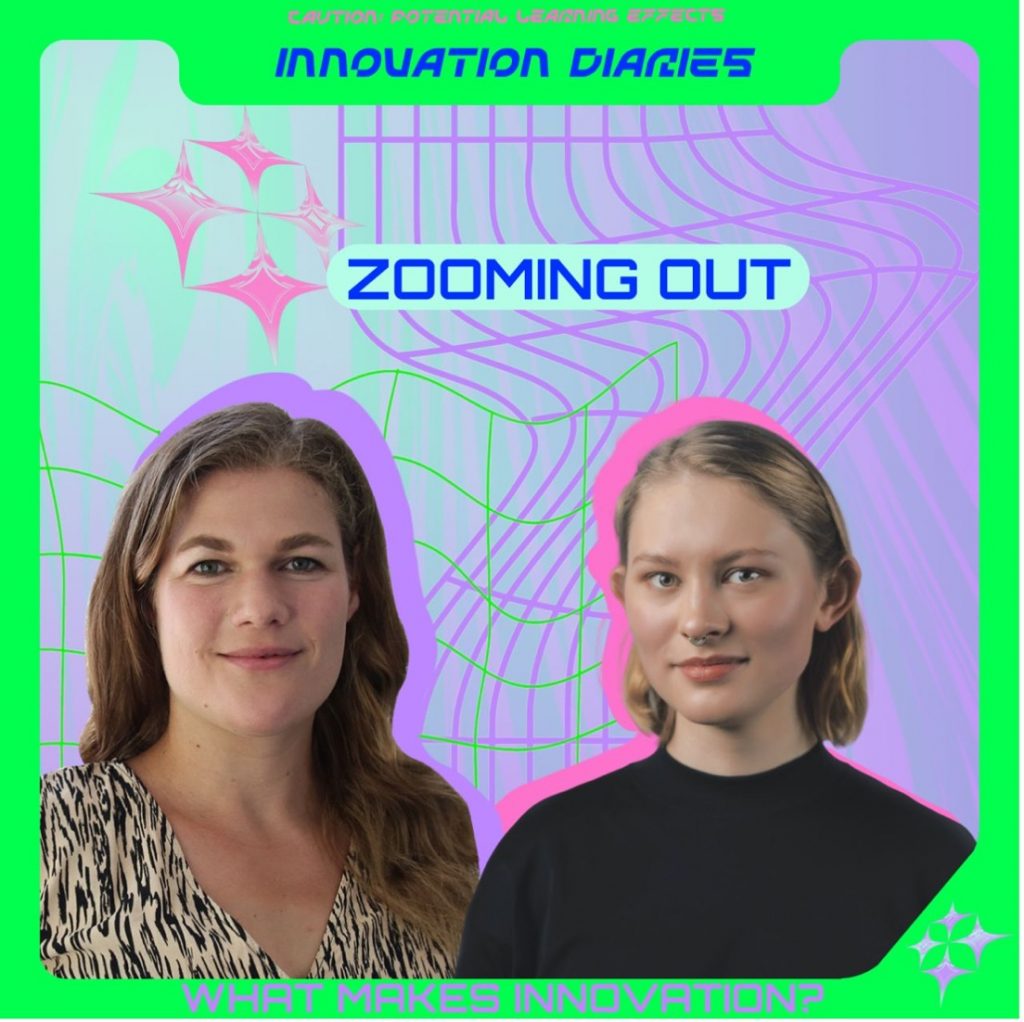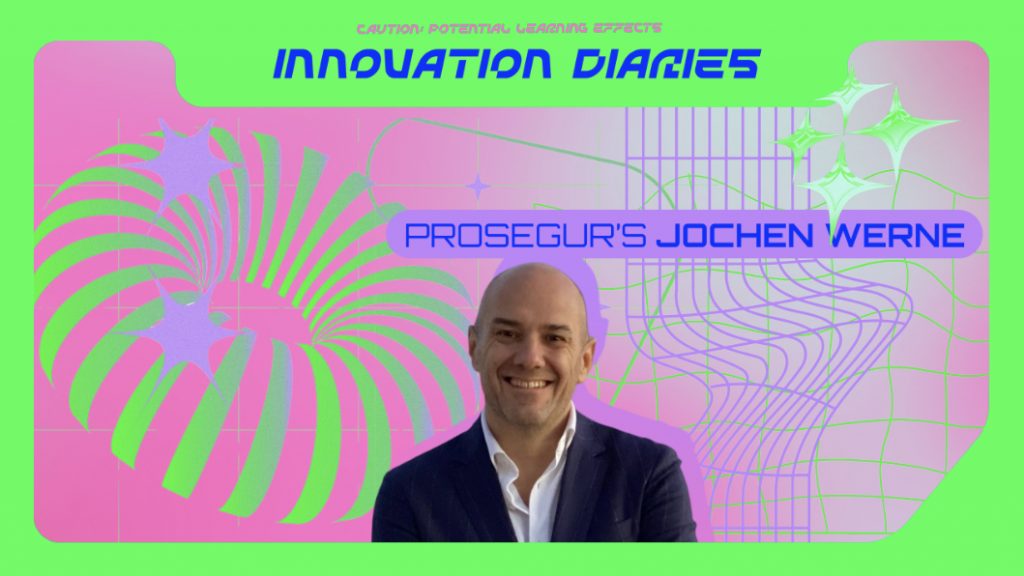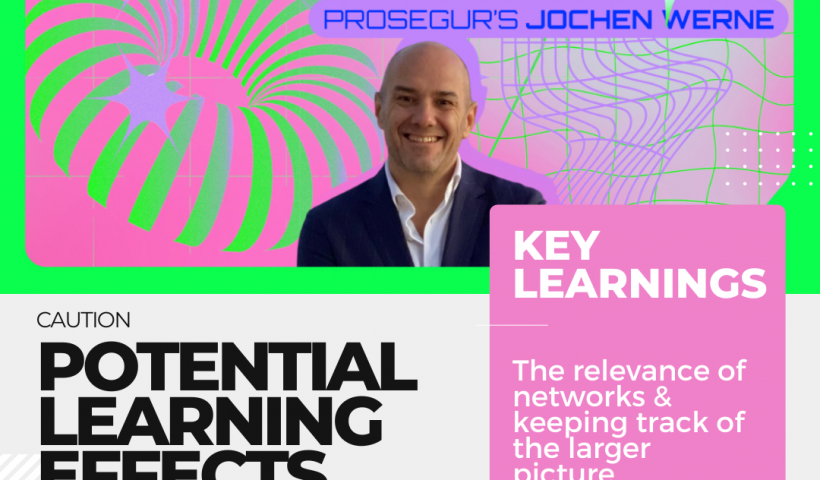THANK YOU CATHARINA and BENTE FOR A GREAT TALK.
Please find the original talk HERE
In the midst of these crazy times, most industries still haven’t gotten their shit together. However, a few bright minds managed to understand the paradigm shift, act accordingly and reap the rewards. So, Catharina van Delden and Bente Zehan talked to some of them! Join us on our learning journey over the next few weeks to see how completely unrelated industries deal very differently with the same challenges we all share – and let’s become better together!

Jochen Werne is Prosegur’s Chief Development and Chief Visionary Officer since 2019. Before that, he worked at different banks, most recently as a director of the German Bankhaus Lenz & Co. Since the beginning of 2022, he is also the managing director of Prosegur Crypto, which is applying for a crypto custody license in Germany.
The Madrid-based company Prosegur offers different security services worldwide. They’re most famous for their cash-in-transit services, with more than 50% market share in Germany. In recent years, Prosegur has explored ways to provide digital security services based on its long experience in a non-digital world.
How do you develop new business models and drive innovation within a company that makes its money with a very traditional business model like cash-in-transit?
I would like to jump right in with a personal example: Before I joined Prosegur in 2019, I had a career in banking. When you work in treasury, you have a lot of money you need to invest. As a bank, we were engaged in the investment business and in our case, most of the money had to be invested in the short term, unfortunately within a negative interest rate environment throughout the last years. So, the best solution would have been to put your money under the mattress instead of in a bank account. When I joined Prosegur, I explained this pain point and we discussed how we could solve this problem for treasurers. Since anything which has fewer costs than 0,5% is considered profit for a treasurer, we offered asset managers, high net worth individuals, and banks custody of short-term liquidity fully insured and compliant in our high-security facilities.
You’re in the security sector. From another conversation I recall you talking a lot about feeling safe vs. actually being safe – an image Catharina and I discussed before starting this series. Our example is a house standing by a cliff, with that a giant tsunami arriving. Instead of thinking about how to relocate, many industries seem to wonder about putting solar panels on the roof and perhaps repainting. Both are valid things to do – however, perhaps they’d have a different focus if they had zoomed out. Is that also a topic within your company, and how do you handle such problems?
This is how new business models and innovations can emerge: You have to take a different perspective, look at other people’s problems and find solutions based on your own experience and knowledge. That is an excellent picture. And if you take that into account, I think also from a psychological point of view, we live in our bubbles. Let’s take, for example, the phenomenon of social media: You “privately” click a like button, watch a video, or comment on a post without really knowing how much this very private behavioral data is influencing an algorithm (which in the best case just targets you as a potential buyer of a certain product). After all, you are only doing it “privately” – but you’re not! If you were to zoom out, you’re back at your tsunami example. It happens in everyday discussions, from climate change to energy crises. Sometimes, people take a point of view and go blindly in one direction. If you’re able to zoom out, you’re also able to change your behavior and find many more solutions to problems.
When making decisions and discussing innovations, it’s important to accept that you yourself are not able to see the whole picture. And based on that, you should go into discussions with an open mind – without thinking you’re completely right and cannot learn anything from the others. Innovation can only happen when people think outside the box, try to understand the whole picture, make new connections, and then act on their new insights.
Business leaders also need to ask themselves how they can innovate. Do they talk about the future, about what they need to create, and how it is no longer the same? Or are they just pushing to quickly return to their classic KPI models, missing the direction the rest of the world is moving in?
How do you take actions from the big picture and implement them? Basically, how do you zoom in again?
Prosegur works in an industry with low-profit margins. We can never sit back and say, “Yes, we have a wonderful company here, everything is going great!” It is labor-intensive work with – obviously – high labor costs.
So we can’t afford to be just visionary; we also need to focus on the essentials. We need justified results every month. Therefore, more than in other sectors, the rule is: if you deliver results, people will listen to you. It’s also part of my job to enthuse people and help them understand new concepts. But I wouldn’t say that’s purely related to my role; anyone in a leadership position should see it that way. Prosegur is a big matrix organization, so you have to use your network to move things forward.
In security, there are a lot of processes with rigid security protocols that won’t be changed in an agile approach quickly and easily. But with other and industry-adequate means the teams are improving efficiency every day.
How do you go about that?
People have to be trained. Otherwise, it won’t work. You have to get people to change. But don’t be surprised that the goal will never be achieved 100% because you will never get everyone to embrace change. Resistance to change within the individual is far too great and it’s very often just too convenient to stay in the comfort zone.
I would like to come back to your example of the house on a cliff. I have seen people who’ve ended up in a disaster professionally because they didn’t want to or were afraid to go into action. You have to be open-minded and sometimes even force yourself out of your personal comfort zone.
You founded Prosegur Crypto GmbH – a business model that to the untrained eye has little to do with your core business: cash. In convincing your board this is a relevant thing to do what are your learnings regarding the degree decision-makers need to understand new technology? Should everyone become a super tech expert?
I don’t ask the whole company’s management to be full experts on all technologies. That’s impossible. But please – as a responsible decision-maker – understand the leading technologies existing in this world! For example, as a banker, you should understand the concept behind blockchain. Of course, this is very technological, and most people can’t explain it in a good manner, but you must understand it. To better understand, decision-makers should have a “new-in-tech” training every couple of months, besides all the usual management training.
So, my appeal to every business leader is: Take your time and try to at least get the gist of things. You should understand what technology can and cannot do, and not just follow your daily headlines. The second part is to really listen to your existing experts whom you pay to know all the details. They need to be at the table and give their input to assess the next useful steps.
Lastly, we’ve talked a lot about networks. What are your best practices regarding this?
It is one of my favorite topics! First of all, you need to know that networks have not just existed since social media came into existence but have always existed. Network organizations have always brought – likewise interested – people together. Unfortunately, also on this topic, we do have to step out of our comfort zones to broaden our perspective. Otherwise, our networks take us as prisoners and we are as the known proverb says birds of the same feather who flock together.
There is very good literature on networks: like “The Square and the Tower” by Niall Ferguson or “The Starfish and the Spider” by Ori Brafman and Rod Beckstrom. Everyone should read these books.
————————————-
Tl;dr for the lazy
• People live in their bubbles and make themselves too comfortable within them, even if it sets them up to fail. It’s important that companies (and we as a society) zoom out to see the bigger picture.
• Innovation and new business development can only happen if you combine your own experiences and opinions with other points of view.
• Companies need to go beyond just recreating and reusing what has already worked for them. They should start asking questions and finding solutions that truly bring them on the right paths into the future. Even or especially if that means that they need to get out of their “safe space” (which is not so safe after all).
• Instead of judging ideas and innovations as being “good or bad”, look at what they “can and cannot do”
• You need to train and communicate openly with people to overcome the resistance towards change.


